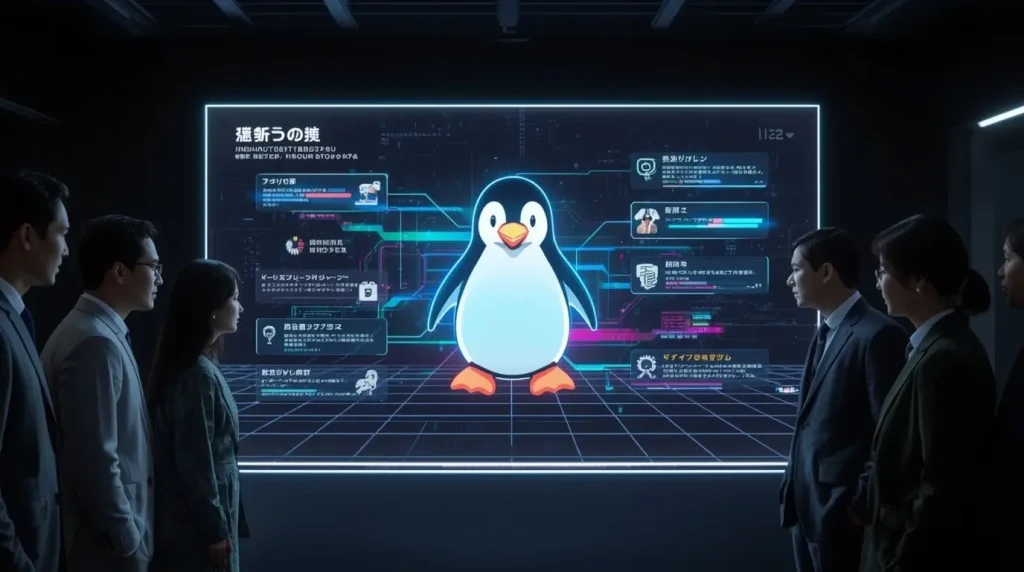In a bold experiment that merges AI and politics, Japan’s Path to Rebirth party plans to name a chatbot penguin as its artificial intelligence leader. This eye-catching move is among the most daring efforts worldwide to use advanced technology to guide a political group. A string of bad election results prompted the party’s founder to resign, and the sudden vacancy led to this trial of digital, penguin-style leadership that could influence party behavior well beyond Japan’s borders.
The chatbot penguin leader, a cheeky digital companion based on Japan’s love for cute animals, won’t appear on the ballot because the law demands that candidates be human. Instead, the intelligence behind the avatar will run the party’s inner operations while a living person—25-year-old AI researcher Koki Okumura from Kyoto University—acts as the public face and aide. This setup marries robotic and human governance, letting the Path to Rebirth skirt legal red tape while still testing how deeply AI can get involved in politics.

The Path to Rebirth Party’s Unconventional Journey
The Path to Rebirth Party launched in January 2025, thanks to Shinji Ishimaru, the former mayor of Akitakata—a cozy city in western Japan with just 26,000 people. Ishimaru became an unlikely hero when he surprised everyone by finishing second in the 2024 Tokyo gubernatorial race. He ran an agile online campaign that spoke directly to those fed up with old-school power players. The result? More than 1.6 million ballots, showing that fresh, digital-savvy moves can rattle traditional politics.
But turning flash in the pan fame into big wins has been another story. When Tokyo’s assembly vote rolled around in June 2025, all 42 Path to Rebirth candidates went home empty-handed, a fate that repeated itself a month later when the party’s full slate of 10 Upper House hopefuls also suffered total defeat. These misses surprised even the harshest analysts and pushed Ishimaru to hand in his leadership badge. That exit opened the door to a trial nobody saw coming: the party let AI robots take the wheel. Without a neat, printed policy guide and with each member free to chase their personal manifesto, the movement, experts say, may have struggled to tell voters: “Here’s exactly why we matter.”
The Vision Behind the Chatbot Penguin Leadership
Koki Okumura, a doctoral student focused on artificial intelligence, serves as the nominal leader of a new political party that sees a chatbot penguin as the future head of state. Okumura believes that a well-programmed AI could make political choices with greater accuracy than any group of humans, freeing minds typically overlooked by human bias. “Our vision,” he says, “isn’t just to replace people but to amplify the voices democracy often silences. An AI-run future could be far more equitable than the one we inherited.”

Choosing a cute chatbot penguin avatar is a strategic wink toward Japan’s love of adorable characters. Ads, merchandise, and digital assistants already flood pop culture with chibi-style animals, and the party aims to ride that wave. The chatbot penguin’s final design remains a mystery, but insiders assure us that prototypes are already being tested, and software is being drafted. The group has yet to announce a deadline for the chatbot to run 100 percent of party operations, a delay that insiders call “a chance to solve the last dozen technical and ethical puzzles.”
Okumura makes clear that the chatbot penguin won’t direct party members’ political activities but will only help with deciding how to share resources among members. This shows a no-nonsense way of using AI, where the chatbot penguin speeds up day-to-day tasks while real people keep the big picture—like core beliefs and campaign plans—under their own control. Splitting the work this way uses human judgment where it counts and lets AI handle number-crunching and logistics in political organizing without stepping on toes.
Legal and Practical Challenges
Putting a chatbot penguin in charge of a political party hits big legal walls under Japan’s current election rules. The law says that anyone running for public office must be a Japanese citizen, so no AI can ever officially be a candidate. Because of this, the AI can run internal party operations, but real human candidates still have to file the paperwork and win votes to be in office. The current rules mean having a human face on the ballot no matter how clever the technology gets.
This situation points to a lingering gap in law whenever new tech moves faster than policymakers can keep pace. Across the globe, tests of AI political candidates have hit similar walls. One telling example came in 2024 when Victor Miller tried to add his chatbot, “VIC,” onto the mayoral ticket in Cheyenne, Wyoming. At almost the exact same time, another contender in the U.K. registered as “AI Steve” for a parliamentary seat in Brighton. Officials in both places quickly interven; Cheyenne regulators said flatly that “an AI bot is not a qualified elector,” echoing concerns heard overseas.
Now the designers of chatbot penguin also must tackle real-world concerns like transparency, accountability, and explainable decision-making. For the system to earn trust not just from the party loyalists but from the wider voting public, every algorithmic step must be clear, and every outcome must be defensible through established political norms. So far, the exact mechanism chatbot penguin will deploy to achieve that clarity hasn’t been spelled out beyond the prototypes.
Prudence from the Pros: The Chatbot Penguin Pitfall
Political pundits and bioethicists aren’t just raising eyebrows—they’re issuing warnings when a hypothetic chatbot penguin promises to run the next election campaign. Hiroshi Shiratori, political science lecturer at Hosei University, bluntly told CNN that voters just aren’t ready to cast a ballot for a party fronted by code and a tuxedo. “People want a face they can trust and a party that mirrors their felt heartbeat,” he said. “A digital entity can’t do any of that.”
Beyond the Twitchy facial polls, Shiratori also fears democracy can wear handcuffs. He warns that permitting machines to decide policies risks a future where every campaign pitches the same predictable playlist. “If every party inches toward the same algorithm-driven center, genuine difference dies,” he argues. “Result? Antithesis of democracy.” His observation nourishes a much larger debate: can slogans serve the public, or merely serve the public to the algorithm that replays them? Without careful silos of diverse voices, the chatter of the campaign may reduce to a single, soulless drumbeat.
Thomas Ferretti teaches ethics and sustainable business at the University of Greenwich and argues that while AI can analyze data and improve how governments work, it still can’t make political decisions on its own. “Values differ all the time, and people argue about the goals that matter to society. AI can’t sort that out for us,” he told CNN. Most AI systems are designed to find technical “best answers,” not to weigh good and bad in terms of ethics, and that’s the mismatch when they get near politics.
Theodore Lechterman, UNESCO’s chair in AI Ethics and Governance at IE University in Spain, added that the link between voters and elected officials goes deeper than handing over authority. “Voters want people in office to make choices, get out in the real world, shake hands, meet other politicians, see what’s happening, hold ribbon-cuttings, and more,” he noted. Even the most sophisticated AI or a chat-based assistant, he argues, can’t pull off all those everyday rituals and relationships that define being a political leader.

Global Context of AI in Politics
The Path to Rebirth party’s pet project with a chatbot penguin as its “leader” isn’t a standalone gimmick; it’s just the most colorful thread in a worldwide fabric of AI in politics. In the U.S. and U.K., there have been quieter but serious moves to put AI model architects behind the throne. Those plans keep bumping into more than just code problems—laws and legal traditions keep swatting the prototypes back to the drawing board. Japan, meanwhile, has gone a more structured route, actually fitting an AI into the high office of one political party to see if a digital brain can run a political brain.
Leaving the headlines aside, every continent is quietly wiring its inner workings to AI. Numerous ministries in Japan, for instance, have handed chunks of daily paperwork to machine minds. Robots now help sift mail, find future brides and grooms in matchmaking programs, and scan neighborhoods for forgotten, dust-covered homes to log. In an aging nation, these bits of software are often touted as the only wave of software that can restock an emptying labor pool. Japan is one emblem, but almost every geriatric economy the world over is pulling similar plans out of pilot mode.
What sets the chatbot penguin experiment apart is the goal to move AI from a behind-the-scenes helper to an active decision-maker. Unlike tasks that simply follow human orders, this AI is designed to pick priorities and craft strategies on its own. The results may teach us a lot about what AI can or can’t do when it comes to running governments.
Implications for the Future of Political Systems
Coaching a chatbot penguin to take charge sparks serious debate about how democracies will change once artificial intelligence is part of the crowd. Supporters, like Okumura, say this shift is coming no matter what: “We’re entering a time when everyone from students to strangers will talk to an AI daily. The question is, how do we update the political and social rules that we once thought would never change?”
Reading today’s political landscape, the Path to Rebirth party’s chatbot penguin feels more like a prototype for the future than a gimmick to draw clicks. This project treats artificial intelligence as a gear we might be able to calibrate before it begins to turn too fast to control. In their eyes, the chatbot penguin can serve as a miniature democracy, revealing irritation and applause novelty can still be gentle. They intend to then mirror the lessons on larger screens, supporting democratic evolution from the ground to the tower rather than the late and chaotic seeding at the tower.
Yet, a shadow is not brutal blow. Analysts warn that teaching a cute artificial avian guiding texts may refine at politics rather than testing credibility at a reassuring pet. This accountability thin ground, where codes make key decisions yet no lambda signature signs them, shakes the very wooden blocks on which we stack accountability. The path between instant data and hard questions can turn fuzzy fog, frightening republics that live electoral light.
Map in hand, the Path to Rebirth is plotting the way further with its penguin. The preparatory team still needs to fix the cadences: the chatbot penguin’s reasoning, how it gulps fresh data and how it extends its tiny flipper to living humans on the party the chatbot penguin is first tethered to. Designers must graft in transparency, a gifting of simple parables so that hidden click and move can still spark anyone’s curiosity on to their screens. In miniature, they may be testing safety nets the republic should later knit higher and, the party hopes, end scattered quickly lost conversations to.
Whether the vision laid out by the Path to Rebirth party can take off hinges not just on tech mechanics, but also on how the public accepts the concept. Media response has swung between bemused eyebrow raises and genuine debate over long-range political impact. How voters digest this penguin-led party could, over a longer horizon, steer rival organizations to explore their own ways to fold AI into everyday operations.
Even if the experiment with a chatbot penguin avatar rolls out slowly and doesn’t land a game-changing shock on the Japanese political map, it quietly injects a needed thread into the wider global fabric of governance debate. As AI tools grow sharper and slip ever-deeper into elections, budget talks, and public policy, societies everywhere face the core question of how, and how much, to invite these smart agents into shared decision making. Japan, through this oddly disarming but serious penguin leader, hands the world a living case study on risks, benefits, and sheer roller-coaster weirdness.
Conclusion: A Cautious Step Into AI-Assisted Politics
The Path to Rebirth party’s push to crown a chatbot penguin as head of state-for-a-party is more than a novelty. It is a threshold moment where Japanese tradition, engineering wit, and the uncertainties of the digital future meet. Delivering on the legal and practical pieces may still take much longer and still dangle a long legal to-do list, but the offer alone evacuates the dusty assumption that politics can stay offline. Instead, the very mention spreads the wider idea that in the age of algorithms, leadership is up for reinterpretation.
Tinkering with the idea of a chatbot penguin in charge of a political party is more than just a circus act—it’s a sneak peek into a possible future. Instead of hoping the experiment becomes a best-selling governance manual, we treat it like a thought experiment that nudges the mind: How will we share power with ever-savvier A.I.? Researcher Katsuya Okumura sums it up: “We want to swim ahead of the current to see what floats up first.” Irrespective of whether the penguin stumbles over its flippers or slides into a landslide win, the case invites every democracy to dust off its mailboxes and drop in some fresh questions.
Japan’s next polling stretch will show if the voting public is up for a candidate that waddles online. Success, or glaring faceplant, is still a short thermal draft for the party titled Path to Rebirth. The reportedly half-way house parent is already cashing in the only currency that matters: international headlines. No matter the poll numbers, the chatter is already more vibrant than a penguin with a popsicle. Throughout the spectacle, the P.R. team behind the curious crest will keep a close cetacean eye, and the planet will watch—half with awe, half with dread—as we all await the first tally of votes and the first batch of lessons.
Source: https://edition.cnn.com/2025/09/19/asia/japan-political-party-ai-leader-intl-hnk
For more incredible stories of everyday news, return to our homepage.




